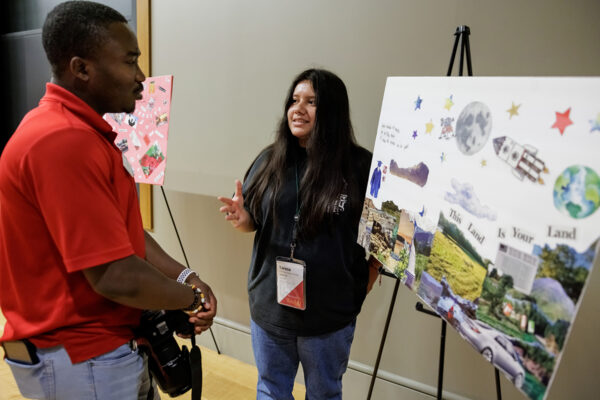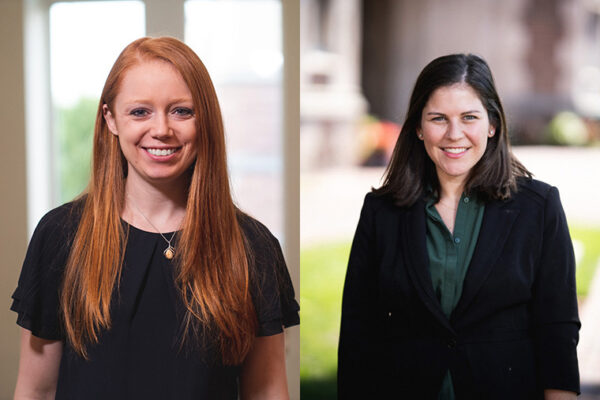This summer, the Department of Political Science in Arts & Sciences launched a new pipeline program, the Washington University Summer Training Experience in Political Science (WUSTEPS), aimed at preparing undergraduate students from diverse backgrounds for success in graduate political science programs.
The first cohort of six undergraduates was recruited from mostly regional schools, including the University of Missouri–Kansas City, Southern Illinois University Edwardsville and the University of Kentucky.
Participants in the six-week program were paired with WashU faculty mentors and given the opportunity to work on active research projects as well as explore their own research interests. They also attended seminars, where they received research methods training and learned about everything from how to apply to PhD programs to career options post-graduation.
‘Our goal with the WUSTEPS program is to give these students a taste of what graduate school would be like and the skills they will need to thrive should they choose to pursue it.’
Dan Butler
“Our goal with the WUSTEPS program is to give these students a taste of what graduate school would be like and the skills they will need to thrive should they choose to pursue it,” said Dan Butler, a professor of political science and the program’s co-director.
“I grew up in an academic household — my dad is a professor — so I was familiar with the university environment and what it would take to become a professor,” he said. “But many undergraduates — especially first-generation students or those who do not attend research universities — have never considered graduate programs or careers in academia. That means we’re missing a lot of talented students, not just for our program at WashU, but for the discipline as a whole.”
Matthew Hayes and Sunita Parikh, both associate professors of political science, co-lead the program with Butler.
Building more diverse applicant pipeline
WUSTEPS builds upon the department’s ongoing outreach efforts to develop strong relationships with regional colleges and universities and to raise awareness about WashU’s graduate school program. Organizers say expanding the pipeline of graduate school applicants will ultimately bring different perspectives into the program, which is a win for everyone.
Thanks to generous funding from Arts & Sciences and the Weidenbaum Center on the Economy, Government, and Public Policy, the program is free for participants, and students receive a stipend for their research work. They also receive free on-campus housing. Organizers say this ensures that money — both in terms of cost to participate and potential lost wages — is not a barrier for the participants they are trying to reach.
When recruiting students, group leaders sought people with the intellectual curiosity to excel in a PhD program, but who lacked the same undergraduate research opportunities that many future graduate school applicants can access.
“Our goal is to bring people into PhD programs and into the discipline who might have otherwise fallen out. We want students who are sensitive to the importance of diversity and inclusion in graduate programs and who have substantive research questions and interests that they want to pursue,” Hayes said.
Jayden Sheridan is a perfect example of the type of student organizers hoped to reach through the WUSTEPS program. Sheridan, a first-generation college student majoring in political science and government at the University of Kentucky, is weighing going to law school or pursing a PhD in political science, with the long-term goal of studying domestic terrorism in the U.S. She said WUSTEPS was a good opportunity to get a feel for what political science research and academic life, in general, would be like.
“One of the things I enjoyed most about this experience was meeting the other participants and faculty members. Our group was diverse; we all brought different perspectives to the discussions. It was really insightful,” Sheridan said.
Naya Busbea, another member of the first WUSTEPS cohort, said she recommends the program for anyone who wants to explore different career and academic options.
“Graduate school is not something that is talked about in undergrad,” said Busbea, who is currently attending McKendree University, where she’s majoring in political science with a minor in ethnic studies.
“WUSTEPS did a good job at showing alternative paths, even beyond academia. One thing I assumed about graduate school is that it would be even more expensive than undergrad, and not everyone could afford to do it. I didn’t realize how much support was available.”
Lessons learned from first cohort
The program also has been a learning opportunity for the organizers. Parikh said that the experience has given her a sense for undergraduates today — what they do and do not know about graduate school and some common misconceptions about applying to graduate school and working in academia. For example, many participants were surprised to learn that graduate programs often offer funding for students in the program.
“There’s a lot of things that we take for granted. Leading this first cohort has shown me how non-transparent the process is to research and apply to grad school. That’s a real barrier for potential students if they do not already have a network to guide them along the way,” Parikh said.

Organizers also say they were surprised by how quickly the students bonded. It’s one of the things that made the program work as well as it did, Butler said. In addition to research and classroom activities, students had the opportunity to attend faculty-hosted barbecues and visit popular St. Louis attractions. There’s also the casual opportunities that come from living in the dorms together.
“Horizontal networking, or networking with peers, is really important,” Hayes said. “When I look back on grad school, what got me through was the relationships I formed with my fellow graduate students.
“I’ve been blown away by how fast they bonded with each other, but that’s also what happens in grad school.”
The program has initial funding for three more years. While new participants will be recruited for each cohort, Hayes said the mentors hope the connections they’ve made with these students will endure and that there will be opportunities for the students to return to campus for research and other professional activities.



